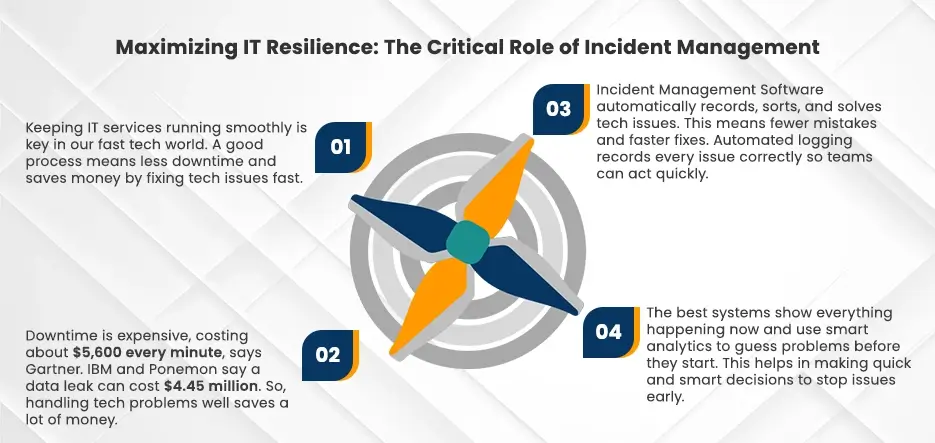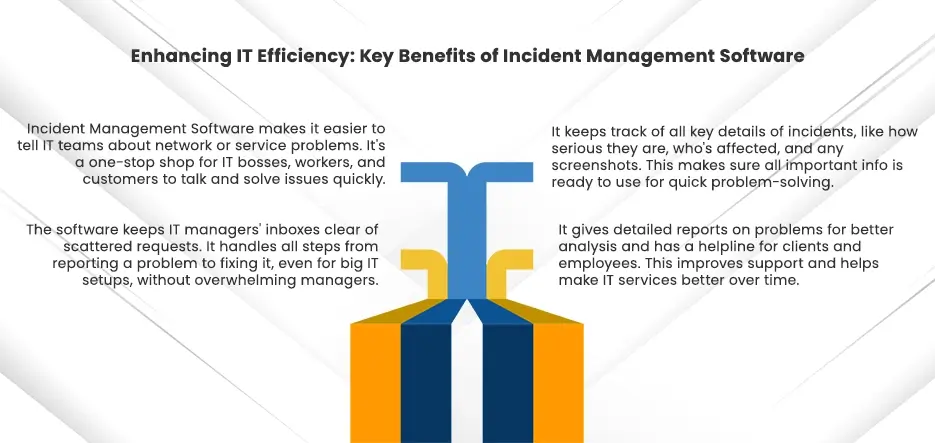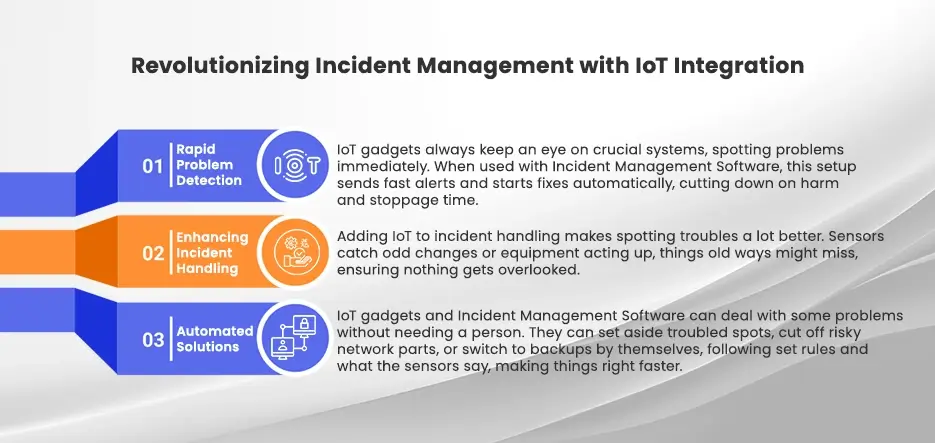Table of Contents
In today’s quick-moving tech world, incidents like system failures, security issues, and data losses happen unexpectedly. They interrupt businesses and affect how happy customers are. Effective Incident Management is key in IT today. It’s the main defense against sudden tech problems that businesses rely on tech face every day.
Incident Management Software is vital for keeping IT services reliable, available, and performing well. A good Incident Management process helps businesses quickly find, respond to, and fix incidents. This reduces downtime and prevents money loss. For example, Gartner found that average IT downtime costs about $5,600 per minute. This shows why an efficient Incident Management system is crucial. Also, as IT gets more complex and cyber threats increase, managing incidents well is key to keeping businesses running and protecting important data. According to the 2023 IBM and Ponemon Institute’s Cost of a Data Breach Report, the average expense associated with a data breach has climbed to an all-time high of US$ 4.45 million, marking a 2% rise from the 2022 figure of US$ 4.35 million.

How Incident Management Software Helps
Incident Management Software is a strong tool for managing IT incidents. It automates logging, categorizing, prioritizing, and solving incidents. This makes the process more efficient and reduces human mistakes. For instance, automated incident logging means every incident is recorded immediately and correctly. This lets IT teams act fast.
This software also has dashboards and reports for a real-time look at incidents and IT service health. This transparency is important for smart decisions and better incident response over time. IBM’s report noted it took 280 days on average in 2020 to find and contain a data breach, showing the need for efficient Incident Management.
Custom enterprise software development is important for better Incident Management. Custom software meets a business’s needs, fitting perfectly with its IT setup and processes. This custom approach boosts efficiency and productivity. It can also add advanced features like predictive analytics and machine learning. These can predict incidents before they happen, strengthening a business’s incident response.
Using Incident Management System Software in IT today is necessary, not just a choice, for businesses wanting to do well in the digital world. With custom software development, businesses can fully use Incident Management Software. This helps them handle IT incidents well. This proactive Incident Management approach reduces business interruptions and improves IT service quality. This leads to happier customers and business growth.
What is an IT incident?
An incident refers to a disruption in day-to-day IT functioning and security activities of an enterprise. An IT incident can affect a micro-level employee to the senior-most member in a firm. Put it simply, anything that affects the business continuity is considered as an incident.
Discover How A3Logics can Transform your Incident Management Process Today!
What is Incident Management?
Incident management is a foundational part of any company that ensures smooth business functioning without any disruption, according to the ITIL framework. ITIL stands for The Information Technology Infrastructure Library. According to ITIL philosophy, proactive systems can’t always prevent incidents in an enterprise.
The ambit of incident management starts from a user reporting an incident to the restoring of the same level of services by the service desk team.
Not only does a cyber attack disrupt normal operations, but it may cause damage to important IT assets and infrastructure that can be impossible to recover from without the budget or resources to do so. – Brett Gallant
Different Stages of Incident Management
Information Technology Infrastructure Library (ITIL) is a standard framework for incident management, followed by most global businesses. It provides a framework of best practices for delivering IT services. Incident management lifecycle is a part of this framework
ITIL’s incident management life cycle provides guidelines for IT professionals to work collaboratively to ensure effective service delivery. ITIL framework is flexible and can be structured in a way that meets the needs of your organization.
Let’s have a closer look at each stage of the ITIL incident management lifecycle.
Stage 1: Incident Logging
A user reports an incident at this stage via any communication channel like SMS, email, call, live chat or self-service portal.
Stage 2: Incident Categorization
Classification of the incident is performed based on the area of IT or business, Reasons which cause disruption in service are also identified like network, hardware etc.
Stage 3: Incident Prioritization
Multiple incidents are prioritized based on the impact and urgency using the priority matrix at this stage. Based on the priority, incidents fall in the categories of Critical, High, Medium, Low.
Stage 4: Incident Routing, Assignment
After the incident is categorized and prioritized, it is transferred to the IT personnel with relevant expertise.
Stage 5: Creating and Managing Tasks
The incident is broken down into sub-activities or tasks. Tasks are typically created when an incident resolution requires multiple technicians with assistance from different departments.
Stage 6: SLA Management and Escalation
Technicians must resolve the incident within the given SLA. Service level agreement is an acceptable time by which an incident must be resolved. If SLA is not met, the incident gets escalated in the upper hierarchy for resolution at earliest.
Stage 7: Incident Resolution
An incident is considered resolved when the technician has come up with a temporary workaround or a permanent solution for the issue.
Stage 8: Incident Closure
An incident can be closed once the issue is resolved and the user acknowledges the resolution and is satisfied with it.
What is Incident Management Software?
An incident management software is a tool that helps companies automate or speed up the process of incident response or management process. It works as a virtual bridge between IT managers, employees and customers.
When users encounter any network or service issue, they can raise tickets or complaints to get timely resolution from the members of the incident resolution team via such software.
By having incident management software in place, you can save your IT managers from receiving ad-hoc service requests in their inbox. Overall, an incident reporting tool organizes and streamlines the entire ticket-to-resolution process without putting an additional burden on managers, even with the largest IT networks.

Key Features of Incident Management Software
- Store critical information about incidents (e.g. severity, users affected, etc.)
- Store additional media (e.g. a screenshot) for incidents.
- Incident prioritization
- Route incidents based on resource availability, time-zones, etc.
- Track status (e.g. open, rejected, duplicate, deferred, closed);
- Report the statistics/metrics about incidents
- On-call incident assistance facility for clients and employees
Why You Should Invest in Incident Management Software
Instead of opting paper-based incident management systems, you should prefer a quality incident management system for your business. This will help you minimize the incident rate at your business.
Let’s explore each reason in detail:
1. Streamline & Standardize Incident Response
Modern emergency incident management software is effective in streamlining and standardising emergency response activities. When using this tool for your business, you can ensure a coordinated response to business anomalies or emergencies. Standardized practices will enable your employees to better understand their duties and corresponding actions during enterprise incidents.
2. Ensure Employees and Clients Safety
Well-designed emergency management system comes with powerful data and communication tools, enabling you to respond to emergencies quicker. This helps you minimize the risk of employee, client and contractors safety. Cloud-based software for incident management provides mobile app support which employees can use anytime, anywhere to report any incident. If they observe a problem, they can immediately alert managers or incident response teams.
Similarly, clients can inform about IT issues (e.g. server errors, downtime, etc.) faster to your company’s designated departments via an incident reporting tool. This ensures critical data is delivered faster and with minimum response times.
3. Reduce Operational Downtime
Safety incident management software provides various kinds of information in a consolidated manner. This helps you analyze complex data and get a complete overview of business problems like security or operational issues. All of this information can be analyzed regularly by your incident response team to identify trends, patterns or issues related to customer service or internal operations.
4. Maintain Effective Internal Business communication
Having a well-designed incident management system in place ensures effective communication at all times between internal staff. Cloud-based software is great to ensure seamless connectivity between staff. Your employees can perform accurate incident reporting anytime, anytime and from any device with a cloud-based system. Cloud services like AWS offer robust security and uninterrupted connectivity for emergency management. Senior managers can track the flow of communications and see whether the incident was escalated or resolved. This gives key personnel real-time situational awareness.
5. Improve Collaboration & Transparency
Collaboration and workflow transparency is important between dedicated teams working in any organization. A quality incident management software can help you drive efficiency – no matter how you’ve set up your IT architecture and development teams.
Partner an expert enterprise software solution provider to get a customised incident management tool for your business. This will help your IT team respond to challenges in real-time by quickly diagnosing an incident. Further up, it will add resilience to your applications and infrastructure, which isn’t something every IT team can do.
6. Faster Anomaly Detection
These software solutions are designed to gather relevant, time-sensitive and accurate incident data. Luckily, IMS of today’s generation has come a long way and become more advanced. How? Modern IMS solutions come with Artificial Intelligence and Machine learning capabilities which enables them to detect a large number of metrics for anomaly detection. This is not possible manually in your business unless you hire hundreds of expert data analysts.
With technology advancements today, companies have more data to work with than ever before. To analyze and find the data that needs your attention (like anomalies) from this large noise, a system like IMS can help your business adapt to changing conditions.
7. Receive Timely Alerts During Emergency Incidents
Some of the modern IMS also serves as an emergency notification system for businesses globally. What this means is they report emergencies like fires or spill incidents in a workplace as soon as they occur. During such chaos, the incident reporting system keeps employees alert via different communication channels like email, voice or SMS.
8. Boost Business Profits
Proactive compliance, safety initiatives and employee training for businesses emergencies can cost you a lot of time and money. Placing a robust incident management software inside your business premise can save costs for you by automating the incident reporting and response practices. An enterprise-wide emergency management system backed by cutting-edge technologies will also help you increase the effectiveness of your planning and preparedness efforts.
9. Save Valuable Time
Cloud solutions are a great tool to ensure robust communication and collaborative response during incident management. Instead of using a traditional paper-based system, you can accomplish more and save your valuable time using an incident reporting tool. For example, incident reporting can be done in minutes with a few easy clicks via software, compared to a paper-based reporting.
10. Stay Better Prepared For Incidents
Using incident management software enables security personnel in your business to perform their job effectively by accurately reporting critical incidents. These solutions easily tie in with other IT systems like inventory software, ERP, etc. to prevent any losses for your business. By using quality SaaS software, you and your employees can stay better prepared to mitigate and prevent any losses.
Enhancing Customer Satisfaction Through Efficient Incident Resolution
In our digital world, solving IT problems fast is crucial. This is very important for keeping customers happy. They want smooth services without interruptions. How quickly and well we fix issues can affect how much customers trust a business. This is why Incident Management Software is a must-have tool.
Incident Management Software helps solve IT problems quickly and well. It automatically detects, records, and fixes IT issues, solving problems immediately. The software lets us watch incidents as they happen, helping IT teams fix the most important ones first. This quick fix helps keep services running well, making customers happy.
For cybersecurity, Security Incident Management Software is key. It finds, checks, and stops security threats fast. Keeping customer data safe is a top priority to keep their trust. Using strong security management tools shows we care about keeping their info safe.
Sometimes, businesses need special software for their unique IT or security needs. Working with the best custom software development companies can improve incident management. They can make software that fits a business perfectly, improving how fast we solve problems and making customers happier.
Adding Artificial Intelligence (AI) and Machine Learning (ML) to Incident Management Software makes cybersecurity measures by AI and ML even stronger. AI and ML can look at lots of data to spot trends and predict issues before they happen. This means we can fix weaknesses before attackers exploit them, keeping customer data safer and services more reliable.
To keep customers happy in our tech-heavy world, we need to fix problems quickly and well. Incident Management Software is essential, especially with added security and custom features. Using AI and ML also helps us stay ahead of cyber threats. Investing in these technologies protects customers and builds trust, helping create lasting relationships.
Leveraging Artificial Intelligence in Incident Management Software
Artificial Intelligence (AI) is revolutionizing Incident Management Software in the fast-changing IT world. By adding AI, companies can make their incident handling faster and more accurate. AI speeds up spotting and fixing issues, improving decision-making. This leads to safer and more reliable IT systems.
AI Powers Faster Incident Spotting
Spotting potential issues early is key. AI boosts Incident Management Software with smart algorithms to watch and analyze data non-stop. It spots problems early, something people might miss. This early warning is vital to stop problems before they get big, keeping systems running smoothly.
After finding an issue, it’s important to figure out its urgency. AI in Incident Management Software does this automatically. It looks at the incident’s details, compares them to past issues, and spots the big problems fast. This lets IT teams focus on what matters most, cutting down on wait times.
Machine Learning Improves and Fixes
AI and machine learning also help fix problems better. They use past data to suggest good solutions quickly. This makes solving problems faster and stops them from happening again. AI gives IT teams helpful advice for tough issues, making it easier to decide what to do.
AI Predicts Safety Issues
In safety and security, AI takes a bigger role. AI-powered safety incident management software predicts possible accidents by looking at data trends. This means companies can stop accidents before they happen, especially in high-risk areas like manufacturing or healthcare.
Putting AI into Incident Management Software might need skills some companies don’t have. That’s where outsourcing to custom software development experts comes in. Companies can get Incident Management Software that meets their specific needs by working with IT Outsourcing Services that know AI well. Outsourcing offers access to top AI talent and cutting-edge technology, ensuring that incident management systems are highly effective and tailored to each organization’s requirements.
For companies aiming to excel in the fast-paced IT world, investing in AI-powered Incident Management Software isn’t just wise—it’s necessary. Whether building in-house solutions or through custom software development outsourcing, AI can give companies an edge, boosting efficiency and ensuring top-notch safety and system reliability.
The Future of IT Incident Management: Trends and Predictions
The way we manage IT incidents is changing fast. Thanks to new tech, stricter rules, and more complex cyber threats, managing incidents efficiently is more important than ever. We’re looking at big trends like more use of Incident Management Software, adding healthcare incident management software, the role of custom software development consulting, and how software development costs are impacted.
Healthcare faces extra challenges, like keeping patient data safe and meeting strict rules. That’s why healthcare incident management software is becoming a big deal. These systems are made for healthcare needs, protecting data and ensuring rules are followed, all while speeding up IT incident responses.
As companies want incident management that fits just right, custom software development consulting will become more crucial. Consultants can help design and implement systems that work perfectly with what a business already has, solving unique challenges and boosting efficiency.
As cyber threats get trickier, incident management systems have to get tougher, with better security features and automatic responses. And with rules around data privacy getting tighter, these systems will also help companies stay on the right side of the law.
Looking ahead, IT incident management is all about new tech, specific solutions for different sectors, and customized systems. Picking and setting up the right Incident Management Software is key. Staying on top of trends and working with custom software development consulting will help businesses manage incidents better, keep everything running smoothly, and build trust.
The Rise of IoT in Incident Management
IoT devices are everywhere, from factories to hospitals, creating huge amounts of data. This data is gold for monitoring everything and managing incidents before they become bigger problems. Incident Management Software is key here, giving a complete picture of how things run.

IoT and Incident Software: The Perks
- Instant Monitoring and Alerts: IoT devices always watch over critical setups. They spot issues right away. The software can quickly send alerts and fix things, reducing harm or stoppages.
- Better Incident Finding: With IoT, we can catch more problems. Sensors can notice stuff that usual checks might miss, like changes in the environment, strange entries, or equipment acting up.
- Quick Fixes: IoT and software together mean some fixes can start independently. For example, the system might turn off risky areas, cut off certain network parts, or switch on backups by itself, following set rules and sensor info.
Developing Software for IoT
Making Incident Management Software that works well with IoT isn’t simple. It needs a good grip on both the software and the gadgets. Custom software development companies in the USA are leading this charge. They build systems that talk smoothly with many IoT devices, fitting perfectly with each business’s needs. These systems can grow with more devices and are made just right for each company.
- Made to Fit and Grow: Custom development means getting your operation’s needs. This could be a special design, connecting with current IT setups and ensuring it can handle more IoT devices later.
- Keeping it Safe: Adding IoT devices brings new security headaches. Custom developers tackle this with top-notch encryption, safe data sending, and updates to keep everything tight.
Testing is Key
Testing is super important in developing Incident Management Software, especially with IoT. Thorough testing ensures the software performs well and stays strong against various challenges.
- Testing for All Devices: IoT devices vary a lot. Testing checks that the software works with every device in the network. This covers different models, systems, and how they talk.
- Handling the Data Surge: IoT means a lot more data. Performance testing ensures the software can handle this extra load without slowing down or stopping, keeping monitoring and responses quick.
- Fighting Cyber Threats: IoT gadgets can be easy targets for hackers. Security testing is crucial, like checking for weaknesses, trying to break in, and seeing if the system spots and stops attacks.
Linking Incident Management Software with IoT devices is a big step in handling incidents as they happen. Custom software development companies in the USA are key in making this work, creating systems that fit specific needs while ensuring top compatibility, performance, and security. As more industries use IoT, this connection will be essential for keeping things safe and running smoothly.
This move shows how critical software testing is in custom development and highlights how IoT transforms incident management.
Measuring the ROI of Incident Management Software in Your Business
Choosing Incident Management Software is smart for your company’s efficiency and safety. Considering the costs, better efficiency, and security boosts, it’s vital to see how much value (ROI) this software brings.
Spending Now vs. Saving Later
- Starting Costs: This includes buying the software or paying for a subscription, setting it up, training your team, and making it work with your current systems.
- Saving Money in Operations: Over time, you save money by having less downtime, fewer security issues, and less time on incident management. Knowing these savings helps figure out the ROI.
Boosting How Things Run
- Faster Fixes: The software finds and fixes problems quicker, cutting down the time it takes. Tracking how quickly issues are resolved before and after software use shows its efficiency.
- Better Use of Your Team: The software handles routine tasks, freeing up your IT staff for bigger projects. Checking how your team’s focus shifts after getting the software shows improvements in how you operate.
Keeping Customers and Businesses Running Smoothly
- Gaining Customer Trust: Incidents and downtime can push customers away. By keeping your system safe and running, the software helps keep and attract customers. Measuring customer satisfaction before and after can show this improvement.
- Ensuring Business Doesn’t Stop: The software keeps your business running during incidents, which keeps your income steady. This benefit should be part of your ROI calculation.
Working with Software Developers
- Customization Costs and Benefits: Hire a custom software development company to make the software fit your needs and work even better. Though it costs more, the benefits of better incident handling and security should be considered in your ROI.
- Adding POS System Integration: For retail companies, linking the software with your POS system adds more security and operational perks. The ROI includes less risk of financial issues and more customer trust, possibly leading to more sales.
Figuring out the ROI of Incident Management Software means looking at many things, from direct savings and better work processes to stronger security and happier customers. By taking a detailed and thoughtful look at these factors, companies can justify the investment and use the software in the best way possible. Working with a custom software development company for tailored solutions, such as POS Software Development and integration, adds even more value, ensuring the software fits your business’s exact needs. Ultimately, Incident Management Software is about more than just the money saved; it’s about building a more resilient, efficient, and competitive business.
Taking Your Incident Management Practices to the Next Level!
Choosing Incident Management Software is smart for any business in our fast-moving digital age. It’s about ensuring your operations run smoothly, keeping data safe, and avoiding costly problems. This software helps fix IT issues fast and stops many problems before they start.
Getting the best Incident Management Software means your business can quickly find, understand, and sort out IT issues. This is key to keeping things running and protecting your data from cyber threats. The top software gives you tools like instant alerts, live tracking, and deep looks into your IT setup. This way, you can stay on top of issues, reduce downtime, and use your IT team where they’re needed most.
Picking the perfect software is crucial. You want one that matches your business needs and works well with your current IT. Working with a custom software development company in the USA might be your best bet. They can create software for you, fitting exactly what your business does, boosting security, and ensuring you follow rules and regulations. Cloud computing security is a big part of today’s incident management software.
We suggest businesses look into Incident Management Software and see how custom solutions from a trusted custom software development company in the USA can meet their unique needs. Whether you aim to improve cloud security, make incident handling smoother, or get better at what you do, the right software can make a huge difference.
If you’re ready to boost your IT incident handling, now’s the time to check out your software options with A3Logics.
Ready to enhance your IT security and efficiency? Contact A3Logics for your Incident Management Software solution!
FAQs
Why is Incident Management Software Essential Now?
In today’s tech-driven world, Incident Management Software is crucial. It is a central spot for quickly managing tech troubles and keeping business running smoothly. With digital systems playing a big part in operations, solving issues quickly keeps customers happy and you ahead.
Can Small Businesses Use This Software?
Small businesses can get a lot from Incident Management Software. Even with tight budgets, the benefits—like less downtime, better security, and happier customers—are worth it. Small businesses rely on tech just as much as big ones do. This software helps manage problems efficiently, keeping operations smooth with whatever tech resources are available.
What Does Getting This Software Mean for My Budget?
The cost to start using Incident Management Software changes based on how big your setup is, your tech environment’s complexity, and what features you need. While there’s an initial cost, consider the long-term savings, like less downtime and better handling of issues, which means saving money.
How Well Does This Software Work With Other Tools?
Incident Management Software works well with other business tools, like IT services, communication platforms, security systems, and cloud services. This makes sharing information automatic, keeps data accurate, and makes solving problems smoother.
How Does This Software Help With Tech Security and Following Rules?
Incident Management Software is key for keeping tech safe and following important rules. It helps spot, respond to, and record tech issues quickly, stopping security threats early. This helps avoid data leaks and the big fines that can come with breaking laws like GDPR or HIPAA.






